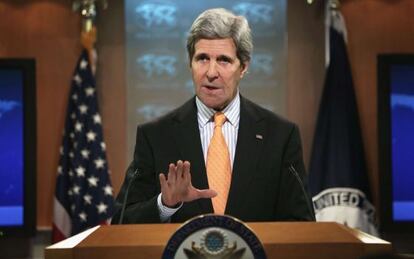Venezuela, Ecuador and Cuba top US human rights blacklist
State Department survey warns of crackdowns on personal liberties and guarantees


A report by the US State Department released on Thursday accused Cuba, Ecuador and Venezuela of being Latin America’s worst violators of restricting personal liberties in the region.
The 2013 Human Rights Report – a global survey used by the US Congress as a guideline when lawmakers study granting aid to other nations – warns about the surge of authoritarian power and the crackdown on freedom of expression in both Ecuador and Venezuela over the past two years.
Corruption, police brutality, impunity, weak justice systems, trampling of guarantees of indigenous people and disrespect for homosexuals are just some of the common rights problems facing the region on the whole, the State Department said in the report.
While US Secretary of State John Kerry placed special emphasis on the situations in Asia and the Middle East during the report’s presentation in Washington, he also referred to the violent protests and jailing of a major opposition leader that have occurred in Venezuelan over the past month.
The report also highlighted public corruption and polarization of the judicial system in Venezuela
“The government has confronted peaceful protestors by deploying armed vigilantes, by imprisoning students, and by severely limiting freedoms of expression and assembly,” Kerry said. “The solution to Venezuela’s problems is not found through violence, and they will not be found through violence, but only through dialogue with all Venezuelans in a climate of mutual respect.”
The recent violence in Venezuela is not included in the report, which only covers incidents and episodes that occurred last year. But the document does refer to the April 14 elections, in which Nicolás Maduro won the presidency by just 1.59 percentage points over rival Henrique Capriles in what the opposition has charged was a fraudulent election. It states that the race was marred by “allegations of widespread pre- and post-election fraud included electoral irregularities, government interference and manipulation of voters,” which reportedly restricted the constitutional right to vote.
The report also highlighted public corruption and polarization of the judicial system in Venezuela. “The government used the judiciary to intimidate and selectively prosecute political, union, business, and civil society leaders who were critical of government policies or actions,” the document stated.
The United States said it was also concerned about how freedom of expression and press are also being attacked. “The government harassed and intimidated privately owned television stations, other media outlets, and journalists throughout the year, using threats, fines, property seizures, targeted regulations, arrests, and criminal investigations and prosecutions.”
The US State Department’s criticism of Venezuela was almost similar to that of Ecuador, where President Rafael Correa has been coming down hard on media outlets critical of his government.
“President Correa and his administration continued verbal and legal attacks against the media and civil society. The government used legal mechanisms, such as libel laws and administrative regulations, to suppress freedom of the press, and societal aggression against journalists continued.”
In Cuba – the third Latin American country on the US blacklist of rights violators – the State Department pointed out how the Castro regime continued to crack down on dissidents. “The principal human rights abuses were abridgement of the right of citizens to change the government and the use of government threats, extrajudicial physical violence, intimidation, mobs, harassment, and detentions to prevent free expression and peaceful assembly.”
US State officials wrote extensively about Colombia where the government has introduced a Victims’ and Land Restitution Law but at the same time where many crimes – committed by the armed forces in their battle with guerrillas – go unpunished. It also focused on the abuses committed by paramilitaries and insurgents, who have been waging a more than 50-year war with the government.
“Impunity and an inefficient justice system subject to intimidation limited the state’s ability to prosecute effectively individuals accused of human rights abuses and to bring to trial former members of paramilitary groups,” the report stated.
Impunity and corruption in the armed forces are two of the biggest problems in the State Department’s focus on Mexico. In its analysis, it cites as examples the extrajudicial deaths, torture and disappearances that have taken place in the country. “Despite some arrests for corruption, widespread impunity for human rights abuses by officials remained a problem in both civilian and military jurisdictions.”
While many nations in the region outright reject the United States’ policing of the rights records – they believe that Washington has no room to criticize because of US policy on capital punishment, political assassinations through drones and Guantánamo – Kerry wanted to eliminate any airs of superiority from the report.
“Our own journey has not been without great difficulty, and at times, contradiction,” Kerry said. “Even as we come together today to issue a report on other nations, we hold ourselves to a high standard, and we expect accountability here at home too. And we know that we’re not perfect. We don’t speak with any arrogance whatsoever, but with a concern for the human condition.”
Tu suscripción se está usando en otro dispositivo
¿Quieres añadir otro usuario a tu suscripción?
Si continúas leyendo en este dispositivo, no se podrá leer en el otro.
FlechaTu suscripción se está usando en otro dispositivo y solo puedes acceder a EL PAÍS desde un dispositivo a la vez.
Si quieres compartir tu cuenta, cambia tu suscripción a la modalidad Premium, así podrás añadir otro usuario. Cada uno accederá con su propia cuenta de email, lo que os permitirá personalizar vuestra experiencia en EL PAÍS.
En el caso de no saber quién está usando tu cuenta, te recomendamos cambiar tu contraseña aquí.
Si decides continuar compartiendo tu cuenta, este mensaje se mostrará en tu dispositivo y en el de la otra persona que está usando tu cuenta de forma indefinida, afectando a tu experiencia de lectura. Puedes consultar aquí los términos y condiciones de la suscripción digital.








































